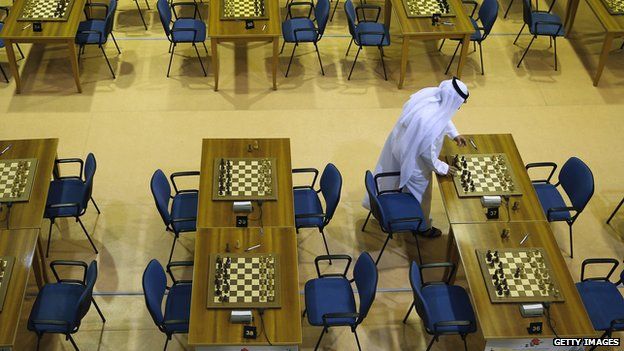DUBAI (Web Desk) – A chess grandmaster has been expelled from an international tournament after he was discovered using a smartphone in the toilet to check his moves.
Gaioz Nigalidze could face a three-year ban if the complaint against him is upheld.
The reigning Georgian national champion was playing Armenian Tigran Petrosian in the sixth round at the Dubai Open.
Petrosian alerted officials after noticing that his opponent was visiting the bathroom at regular intervals.
Nigalidze was apparently using the same cubicle each time for ten minutes or more, arousing his rival’s suspicions.
When the player emerged from the toilet, officials discovered a smartphone wrapped in toilet tissue and buried in the bin.
“He denied it was his, but it was logged into his Facebook page and there was a chess program running on it, showing his positions,” the tournament director Yahya Mohamed Saleh told the BBC from Dubai.
The first prize up for grabs at the competition was $12,000 (£8,000).
Gaioz Nigalidze did not respond to an email request for comment.
The Georgian Chess Federation called the incident “very bad,” but said it was waiting to hear the player’s side of the story before passing judgment.
“He is very talented,” Sofiya Nikoladze told the BBC.
“He’s a very nice young man and I would never have thought he could do such a thing,” she said of the 26 year old, who is ranked 400th in the world.
It is the first case of a grandmaster being referred to the International Chess Federation (FIDE) since it established an Anti-Cheating Commission last year.
Describing the problem in chess as “high-tech doping,” officials say they have increased their efforts to stamp it out.
As computers have become more discrete and more powerful, FIDE has begun deploying metal detectors, blocking devices and carrying out random inspections of players to prevent their use at competitions.
In 2008, before smartphones became widespread, an Iranian player was banned from the Dubai Open for taking tips via text message.
Today, cheating is relatively rare at the top level but lesser players have been known to hide electronic devices in their socks and shoes, and even inside their ears.
As a result, arbiters are now permitted to search competitors. Failure to comply can lead to expulsion.
“The problem [of electronic cheating] has increased in the past three or four years, so we’ve made special efforts to combat it,” Yuri Garrett, secretary of the Anti-Cheating Commission explains.
He says a poor cheat who manages to consult a computer and then makes too many strong moves will easily be spotted; a more intelligent fraudster who only seeks outside help a few times might evade automatic detection.
A formal complaint has been sent to the anti-cheating commission at FIDE, which is now investigating. The commission then refers the case to an ethics committee for a ruling.
Should it confirm that Gaioz Nigalidze was using a computer to help his game in Dubai, the Georgian will be penalised with a lengthy ban from chess.
That would make the decision to cheat the worst move of his career.














